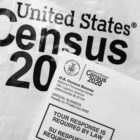Census 2020
Census deadline moved up, surprising NM native communities
|
New Mexico’s tribal communities suddenly find themselves in a rush to reorganize their plans to ensure a complete census count after federal authorities on Monday abruptly moved the deadline up by a month, from the end of October to September 30.
“We have pretty much lost a month of time to be able to gain that accurate count in our communities,” Ahtza Dawn Chavez, Executive Director of the Native American Voters Alliance Education Project, which heads up the New Mexico Native Census Coalition, told state leaders on Tuesday during a legislative hearing at the Roundhouse in Santa Fe. “Our average self response rate is just over 30 percent, we have a lot of work to do going forward.”
American Indian leaders across the country have reacted strongly to the news. In a joint statement issued Wednesday, national Native organizations said they were “deeply alarmed and concerned with this unwarranted and irresponsible decision.” “Our tribal nations and tribal communities have been ravaged by COVID-19, and an extension of the Census enumeration period was a humane lifeline during an unprecedented global health catastrophe that provided critically needed additional time to tribal nations to ensure that all of everyone in their communities are counted,” the statement said.In a separate statement, U.S. Rep. Deb Haaland, D-NM, who made history in 2018 as one of two indigenous women elected to Congress, said changing the deadline “flies in the face of Director (Steven) Dillinghan’s promise to me that he understood the importance of meeting our needs.”
The once-a-decade census count provides population numbers that determine to a large degree how much public money flows to tribes and other communities through federal, state and local funding programs. The new deadline threatens to increase chances for an undercount in tribal communities that currently have a response rate far below the national rate of 63%.
The presentation by Chavez to the New Mexico Indian Affairs Committee highlighted how the COVID-19 pandemic has hindered the census count. Census officials need access to tribal lands to complete the count. Their work includes door-to-door drops of census packets and in-person follow-up visits to homes that haven’t responded.
But census workers need permission of tribal authorities to enter tribal communities, and several tribes in New Mexico, which have been disproportionately hard-hit by the pandemic, are currently closed to non-members due to the public health emergency.
